
“When the whole world is silent, even one voice becomes powerful.”
Malala Yousafzai
Jobs Update
Initial and Continuing Jobless Claims
- Initial jobless claims for the week ending February 26th came in at 215,000, down -18,000 people week over week.
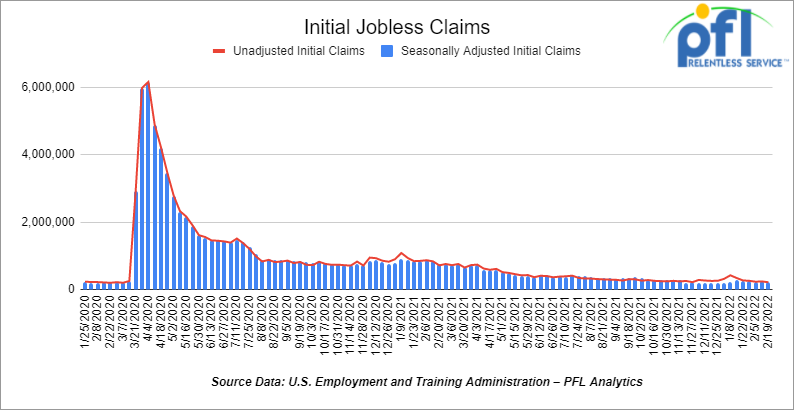
- Continuing claims came in at 1.746 million people versus the adjusted number of 1.474 million people from the week prior, up 272,000 people week over week.
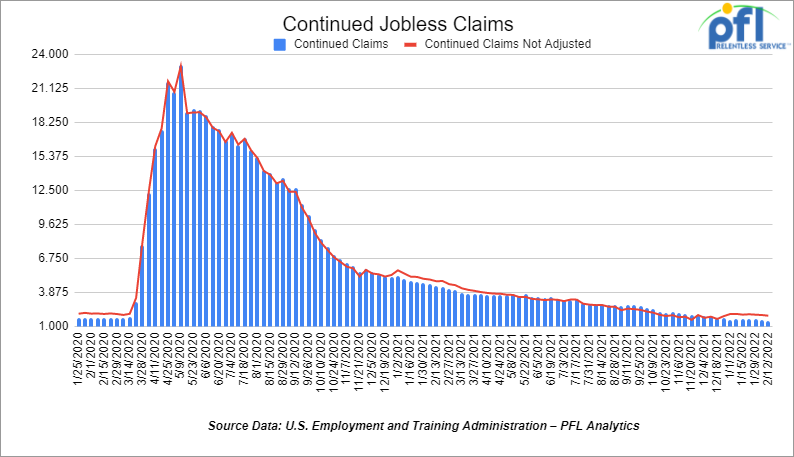
Stocks closed lower on Friday of last week and down week over week
The DOW closed lower on Friday of last week, down -179.86 points (-0.53%), closing out the week at 33,614.8 points, down -443.95 points week over week. The S&P 500 closed lower on Friday of last week, down -34.62 points and closed out the week at 4,328.87, down -55.78 points week over week. The Nasdaq closed lower on Friday of last week, down -224.5 points (-1.66%) and closed out the week at 13,313.44 down -381.18 points week over week.
In overnight trading, DOW futures traded lower and are expected to open at 33,000 this morning down 583points.
Oil closed higher on Friday of last week and higher week over week
Oil surged on Friday, ending the week at multi-year highs as Russia’s invasion of Ukraine intensified and oil buyers shunned barrels from the world’s second-largest exporter of crude.West Texas Intermediate (WTI) crude closed up $7.33 (6.81%) on Friday of last week to settle at $115, up $23.05 per barrel week over week, while Brent closed up $7.65 to settle at $118.11 per barrel, up +20.18 a barrel week over week.U.S. commercial crude oil inventories (excluding those in the Strategic Petroleum Reserve) decreased by 2.6 million barrels week over week. At 413.4 million barrels, U.S. crude oil inventories are 12% below the five year average for this time of year.
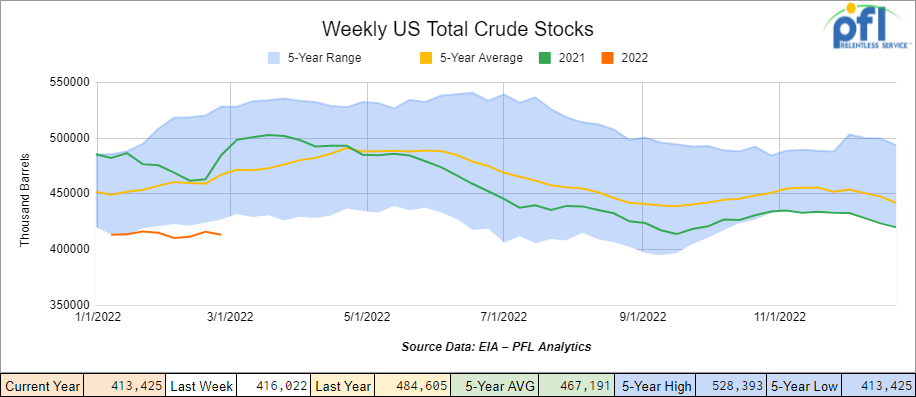
Total motor gasoline inventories decreased by 500,000 barrels week over week and are 1% below the five year average for this time of year.
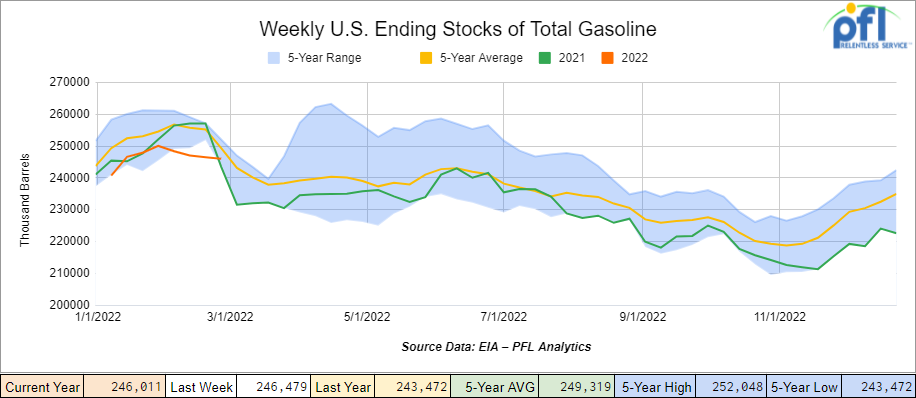
Distillate fuel inventories decreased by 600,000 barrels week over week and are 16% below the five-year average for this time of year.
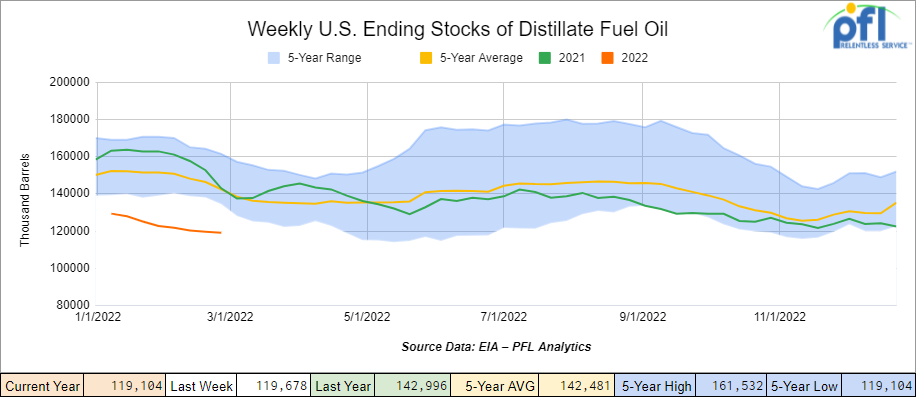
Propane/propylene inventories decreased by 800,000 barrels week over week and are 20% below the five year average for this time of year.
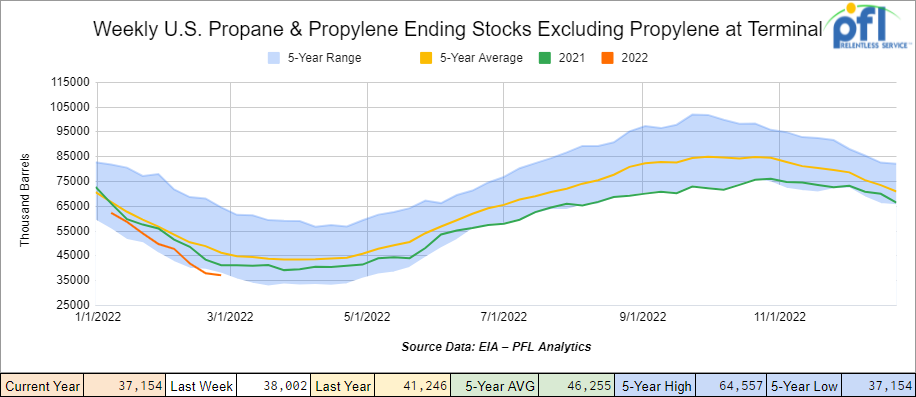
Propane prices moved higher week over week closing at $1.30 per gallon up 2 cents per gallon and up 34 cents per gallon year over year.
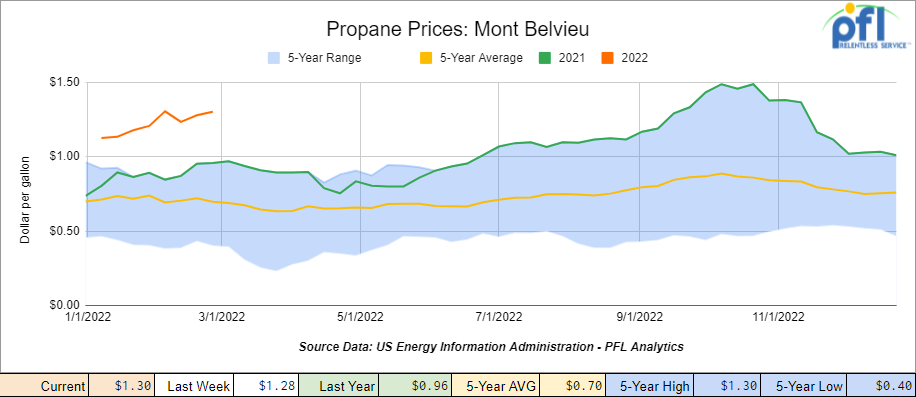
Overall, total commercial petroleum inventories decreased by 3.9 million barrels week over week.
U.S. crude oil imports averaged 5.8 million barrels per day for the week ending February 25, 2022, a decrease of 1.1 million barrels per day from the previous week. Over the past four weeks, crude oil imports averaged about 6.2 million barrels per day, 9.4% more than the same four-week period last year. Total motor gasoline imports (including both finished gasoline and gasoline blending components) averaged 603,000 barrels per day, and distillate fuel imports averaged 403,000 barrels per day for the week ending February 25, 2022.
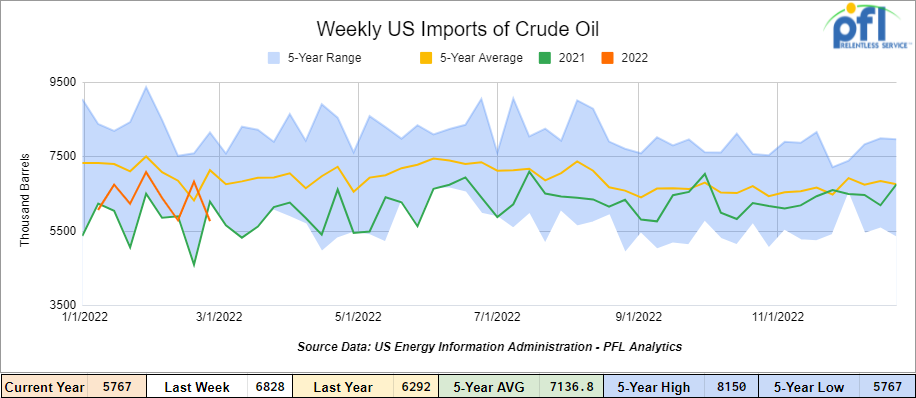
U.S. crude oil refinery inputs averaged 15.4 million barrels per day during the week ending February 25, 2022 which was 153,000 barrels per day more than the previous week’s average.
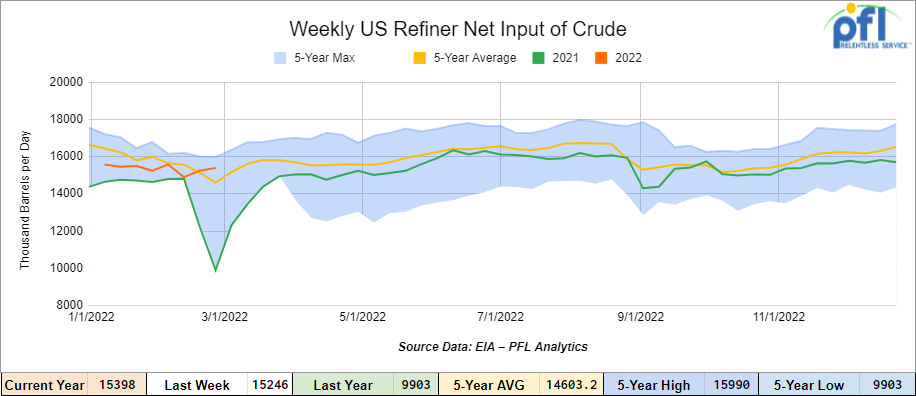
As of the writing of this report, WTI is poised to open at $122.37 , up $6.69 per barrel from Friday’s close.
North American Rail Traffic
Total North American rail volumes were down 2.8% year over year in week 8 (U.S. -0.3%, Canada -12.7%, Mexico +4.6%) resulting in quarter to date volumes that are down 4.0% year over year (U.S. -2.4%, Canada -10.3%, Mexico -0.2%). 8 of the AAR’s 11 major traffic categories posted year over year declines with the largest decreases coming from intermodal (-5.5%), grain (-11.9%) and motor vehicles & parts (-14.4%). The largest increase came from coal (+11.2%).
In the East, CSX’s total volumes were down 3.7%, with the largest decreases coming from intermodal (-5.4%) and chemicals (-10.1%). The largest increase came from stone sand & gravel (+29.8%). NS’s total volumes were flat, with the largest increase coming from intermodal (+1.9%) and the largest decrease coming from motor vehicles & parts (-23.2%).
In the West, BN’s total volumes were down 0.6%, with the largest decreases coming from intermodal (-3.9%) and grain (-9.8%). The largest increases came from coal (+14.5%) and chemicals (+18.1%). UP’s total volumes were up 2.8%, with the largest increases coming from chemicals (+28.7%) and coal (+18.5%). The largest decrease came from intermodal (-7.3%).
In Canada, CN’s total volumes were down 9.8%, with the largest decreases coming from intermodal (-15.6%), farm products (-58.9%) and metallic ores (-14.1%). The largest increase came from coal (+58.5%). RTMs were down 8.8%. CP’s total volumes were down 11.6%, with the largest decreases coming from intermodal (-8.0%), farm products (-73.5%) and grain (-24.6%). RTMs were down 13.4%.
KCS’s total volumes were up 4.3%, with the largest increase coming from intermodal (+5.7%) and the largest decrease coming from petroleum (-27.3%).
Source: Stephens
Rig Count
North American rig count is down by -7 rigs week over week. U.S. rig count was flat week over week and up by 247 rigs year over year. The U.S. currently has 650 active rigs. Canada’s rig count was down by -7 rigs week over week and up by 76 rigs year over year and Canada’s overall rig count is 217 active rigs. Overall, year over year, we are up 323 rigs collectively.
International rig count which is published monthly is down by -28 rigs month over month but up by 112 rigs year over year. Internationally there are 813 active rigs.
North American Rig Count Summary

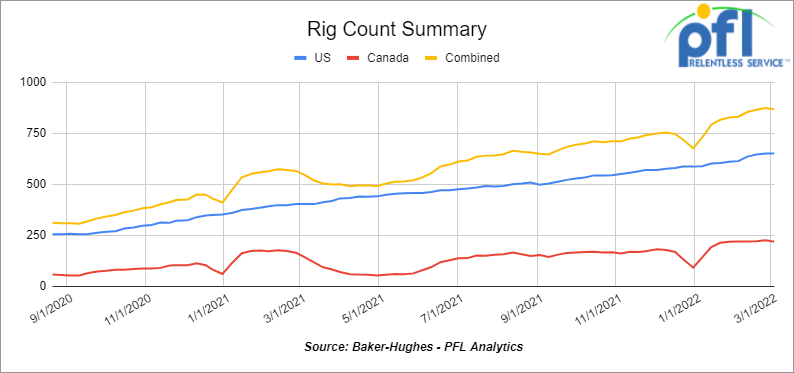
A few things we are keeping an eye on:
Petroleum Carloads
The four-week rolling average of petroleum carloads carried on the six largest North American railroads rose to 24,145 from 24,264, a loss of 119 rail-cars week over week. Canadian volumes were lower week over week CP shipments were down by 9.6% while CN volumes were down by 0.4 %. U.S. volumes were mostly higher with the NS having the largest percentage increase (up by 11.00%) UP had the largest percentage decrease down by 6.4%.
Workers At CP Rail Vote To Strike Starting On March 16
Some 3,000 workers at Canadian Pacific Railway (CP) have voted to strike beginning on March 16, according to their union.The potential labor disruption at one of Canada’s largest railways threatens to upend global supplies of fertilizer just as farmers need nutrients to plant spring crops.
Canada, along with Russia and Belarus, is one of the main sources for the world’s potash, a commonly used fertilizer that contains potassium. A potential work stoppage comes amid concerns of shortfalls in supplies amid Russia’s invasion of Ukraine and economic sanctions on both Russia and its ally Belarus.
Management at CP Rail has offered wage increases for a two-year collective agreement and agreed to 20 union demands. However, the union is not satisfied with the proposals and concessions from management and has now voted in favor of a work stoppage.
Shipping disruptions across Canada could drive up the prices of lumber and other commodities, which are already at all-time highs and putting strains on businesses and consumers.
Lumber futures in Chicago immediately traded higher on the back of the news to multi week highs.
Some Key Economic Indicators
According to the second preliminary estimate released by the Bureau of Economic Analysis (BEA) on February 24, U.S. GDP grew an annualized 7.0% in Q4 2021 from Q3 2021. The first estimate was 6.9%.
Inflation remains very high and not going to get better anytime soon. The consumer price index was 7.5% higher in January 2022 than in January 2021, and the inflation measure favored by the Federal Reserve — the price index for personal consumption expenditures — was up 6.1% in January. Both inflation readings were the highest since February 1982
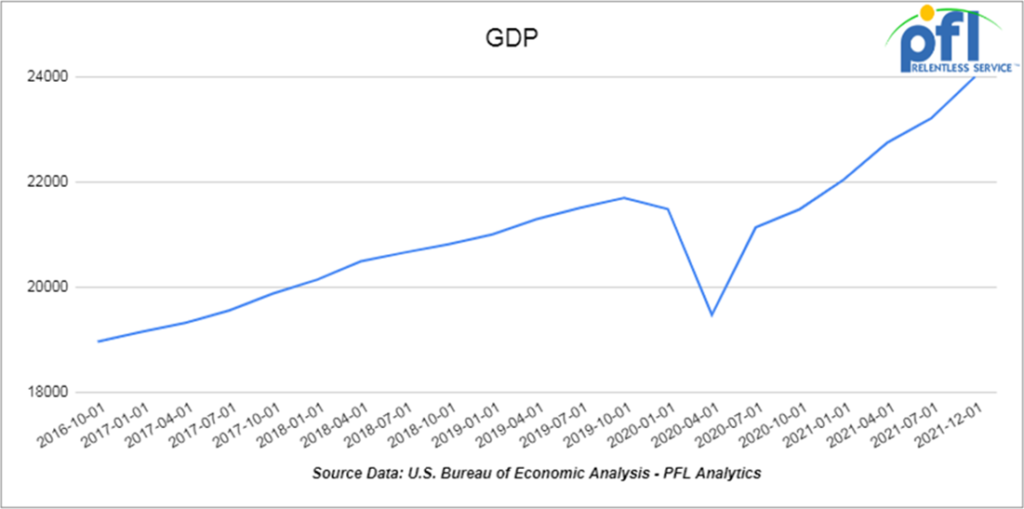
Purchasing Managers Index (“PMI”) – The PMI (which covers manufacturing) and the Services PMI (covering services) are both from the Institute for Supply Management. They are based on surveys of supply managers around the country. The surveys track the direction of changes in business activity. An index reading above 50% indicates expansion; below 50% means contraction. The more above or below 50, the faster the pace of change.
The PMI rose to 58.6% up from 57.6 in February. February marks the 21st consecutive month of manufacturing expansion. The new orders component of the PMI was 61.7% in February. That’s up from 57.9% in January and the highest it’s been in five months. In a press release, Tim Fiore, who manages the PMI, said, “The impact of omicron declined in February as swiftly as it appeared in December, leaving March and April’s manufacturing environment favorable, especially with new orders and backlogs registering strong growth.”
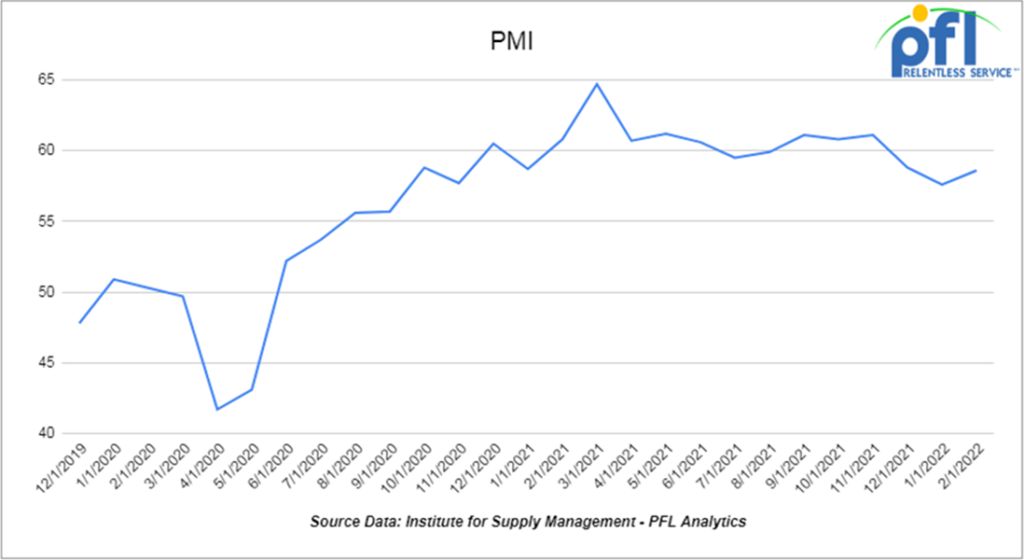
U.S. industrial output in January 2022 was the highest since December 2018. Output in January 2022 was 1.4% higher than in December 2021 and 4.1% higher than in January 2021.
Manufacturing, which accounts for around 75% of total output, rose a preliminary 0.2% in January from December, gains included, agricultural chemicals (up 3.0%) — output in January was the highest since mid-2019); grain mill products (up 2.6%, highest output since early 2019); lumber and wood products (up 0.2%, highest output since fall 2018); and railroad rolling stock (up 3.3%).
Manufacturing categories with output declines in January from December included nonmetallic minerals (down 8.0%); autos and auto parts (down 0.9%); petroleum refineries (down 0.6%); and iron and steel products (down 0.7%).
Utility output, which is not included in manufacturing, rose 9.9% in January from December thanks to colder than normal temperatures in much of the country. Mining output, which includes oil and gas extraction, rose 1.0% in January from December, its fourth straight monthly increase.
Total U.S. capacity utilization in January was a preliminary 77.6%. That’s up from 76.6% in December, the highest it’s been since March 2019, and 1.9 percentage points below its 1972–2021 average, according to the Federal Reserve. Capacity utilization for manufacturing was a preliminary 77.3% in January, up from 77.2% in December and the highest it’s been since December 2018. Total U.S. industrial production dropped slightly in December 2021 — down a preliminary 0.1% from November 2021, but it was still the second highest since November 2019. December 2021 was 3.7% higher than December 2020 and 0.6% above its pre-pandemic February 2020 level.
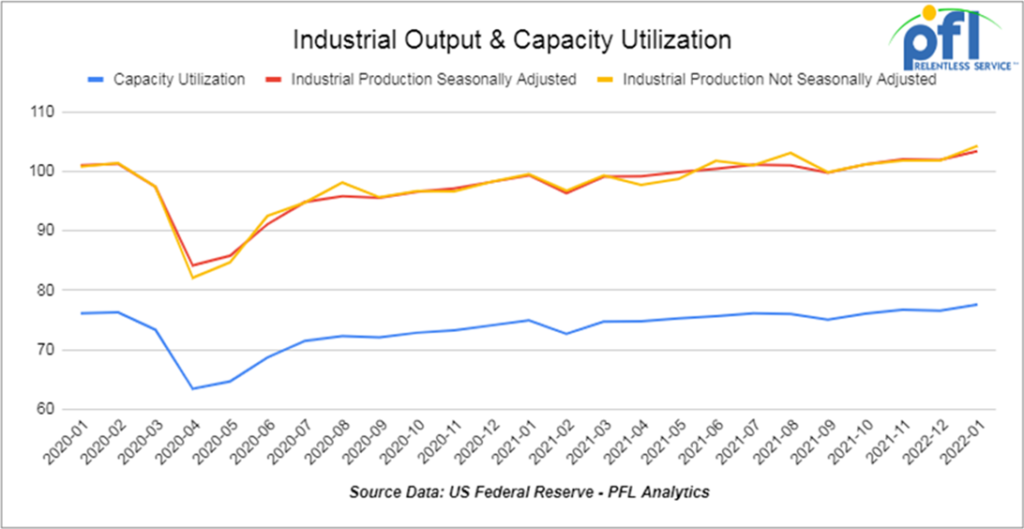
The Bureau of Labor Statistics reported March 4 that a preliminary 678,000 net new jobs were created in February 2022, the most in seven months and well above the prior consensus among economists of a gain of around 440,000. It’s a sign that the coronavirus’s impact has faded.
Bottom line the official unemployment rate in the U.S. now stands at 3.8%
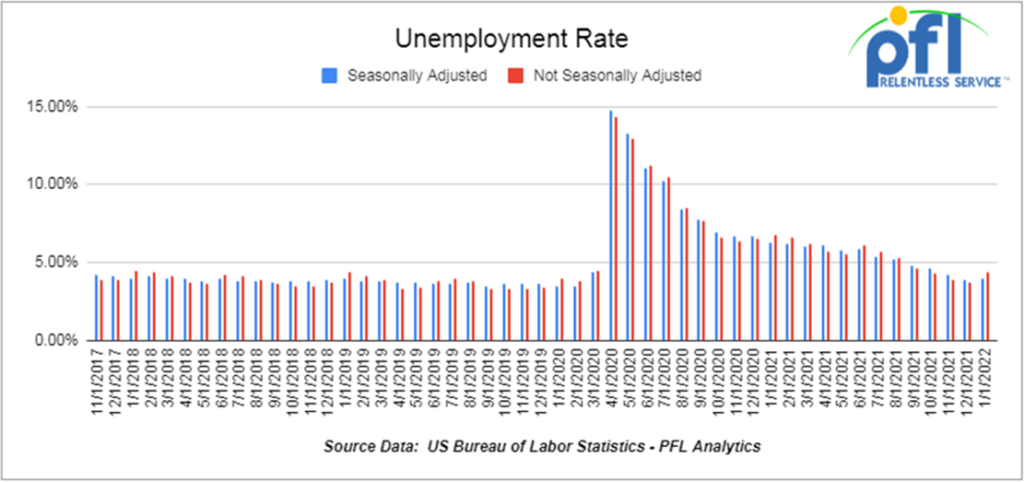
The Conference Board’s index of consumer confidence was 110.5 in February 2022, the lowest it’s been in five months and well off its recent peak of 128.9 back in June 2021.
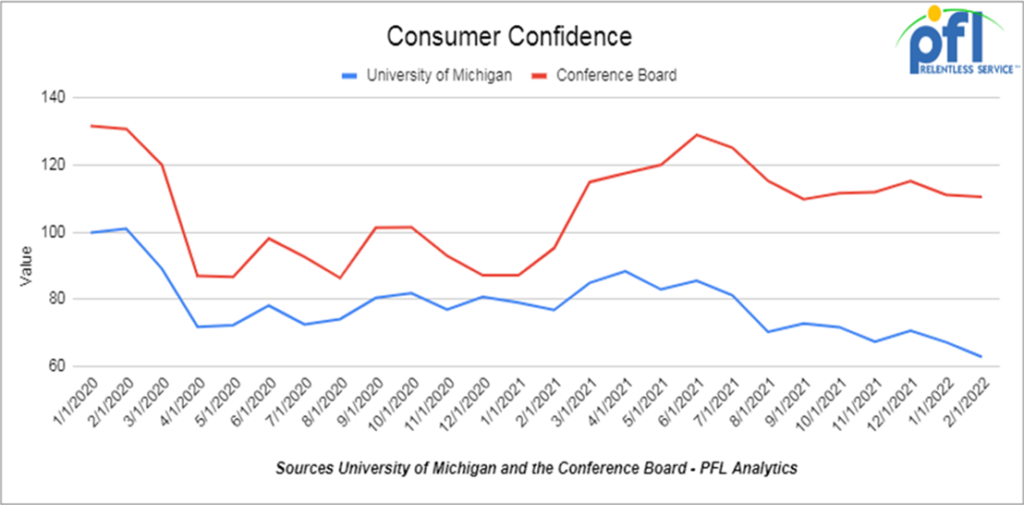
Total consumer spending not adjusted for inflation rose a preliminary 2.1% in January 2022 from December 2021, the biggest gain since March 2021 and a hopeful start for the year. Consumer spending accounts for roughly 70% of the U.S. economy. Spending on goods rose 5.2% in January from December, a big change from the 3.2% decline in December from November. Spending on services in January rose 0.5% from December,
Adjusted for inflation, total consumer spending rose a preliminary 1.5% in January from December, also the biggest month-to-month gain since March 2021.
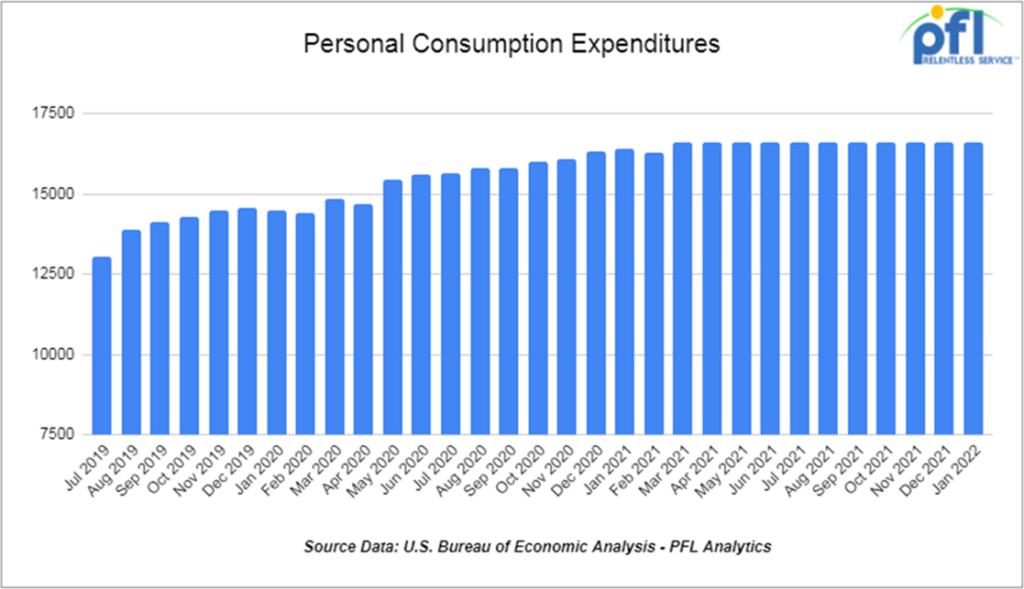
We have been extremely busy at PFL with return on lease programs involving rail car storage instead of returning cars to a shop. A quick turnaround is what we all want and need. Railcar storage in general has been extremely active. Please call PFL now at 239-390-2885 if you are looking for rail car storage, want to trouble shoot a return on lease scenario or have storage availability. Whether you are a car owner, lessor or lessee or even a class 1 that wants to help out a customer we are here to “help you help your customer!”
Leasing and Subleasing has been brisk as economic activity picks up. Inquiries have continued to be brisk and strong Call PFL Today for all your rail car needs 239-390-2885
PFL is seeking:
- 5, 29k Tank Cars needed in Texas off the KCS for 5 years. Needs to be lined.
- 100, 2480CUFT Ag Gons needed in Texas off the UP for 1-3 Years.
- 50, 30K+ Tank cars needed in several locations. Can take in various location off various Class 1’s. Can have prior Ethanol heel or Gasoline heel.
- 300 5800 Covered hoppers needed for plastic – 5 year lease – negotiable
- 50 29K C&I Tanks for veg oil to purchase – Immediate need
- 15 5200-5500 PD hoppers in the west UP for 5 years for soda ash negotiable
- 30 5800 and 6250 covered gons for sale
- 50, 5800cuft or larger Covered Hopper for use in DDG needed in the Midwest for 3-4 years. Immediate need.
- 10-20 Covered hopper grain cars in the midwest 5200-5500 2-3 years
- 20-30, 19K Tank Cars for Caustic Soda needed in Texas off the UP or BN.
- 100 Moulton Sulfur cars for purchase – any location – negotiable
- 12 Plate F 286 GRL Boxcars 12’ plug doors midwest preferred for 1 year lease
- 30-50 Log Flats with stanchions 286K GRL in the midwest/east CSX NS 1-3 years negotiable
- 50 Ag Gons 2500-2800cuft 286k GRL in the east CSX for 5 years negotiable
- 25 Covered wood chip Gons 6000CF 286 GRL any location for 1-3 years negotiable
- 25 Boxcars for paper 6000CF 286 GRL 1-3 years anywhere
- 100 15K Tanks 286 for Molten Sulfur in the Northeast CSX/NS for 6 months negotiable
- 100, 5800 Covered Hoppers 286 can be West or East for Plastic 3-5 years
- 70, 117R or J needed for Ethanol for 3 years. Can take in the South.
- 50, 6500+ cu-ft Mill Gon or Open Top Hopper for wood chips in the Southeast for 5 Years.
- 25 bulkhead flats 286 any class one for up to 5 years Negotiable
- 20, 19,000 Gal Stainless cars in Louisiana UP for nitric acid 1-3 years – Oct negotiable
- 10, 6,300CF or greater covered hoppers are needed in the Midwest.
- 2, 89’ Flat cars for purchase or lease – needed in TX off the BNSF
PFL is offering:
- Various tank cars for lease with dirty to dirty service including, nitric acid, gasoline, diesel, crude oil, Lease terms negotiable, clean service also available in various tanks and locations including Rs 111s, and Js – Selection is Dwindling. Call Today!
- 200 Clean C/I 25.5K 117J in Texas. Brand New Cars!
- 150 25.5 111’s in the midwest for sale – Negotiable
- 150 117R’s 31.8 clean for lease in Texas – negotiable
- 31.8K Tank Cars last in Diesel. Dirty to dirty in Texas
- 200 117Js 29K OK and TX Clean and brand new – Lined- lease negotiable
- 100 117Rs dirty last in Gasoline in Texas for lease Negotiable
- 90 117Rs 30K located in Alberta CN or CP Refined Products Dirty – negotiable
- 25 BRAND NEW 5161 Sugar Hoppers in Arkansas UP – negotiable
- 99 340W Pressure Cars various locations Butane and Propane dirty negotiable
- 100 73 ft 286 GRL riser less deck, center part for sale
- 19 auto-max II automobile carrier racks – tri-49 for sale – negotiable
- 10 food grade stainless steel cars sale or lease
- 20 20K Stainless cars in 3 locations in the south – sale or lease – negotiable
- 30 CPC 1232 25.5K C/I Pennsylvania NS clean negotiable
- 100-150 29K C/I 117J cars for lease. Dirty in Bakken crude and can be returned dirty.
- 100 29K C/I 1232 cars for lease. Dirty in Heavy Crude and can be returned dirty.
- 50 29K 117Js in Nebraska for sale or lease clean last in crude – available Feb 2022
- 100 117Rs 29K clean last used in crude Washington State – price negotiable sale or lease
- 21 111s 29K tanks last in alcohol dirty on the CN in Wisconsin for lease price negotiable
- 100 111s of various volumes and locations last in fuel oil dirty price negotiable
- Various Hoppers for sale and lease 3000-5800 CF 263 and 286 multiple locations negotiable
- 28 20K Veg oil cars for lease in Arkansas – Negotiable
- 100 3200 Covered Hoppers for sale price negotiable
- 100 Center beam Flats with risers 73ft in SD and Iowa for sale negotiable
Call PFL today to discuss your needs and our availability and market reach. Whether you are looking to lease cars, lease out cars, buy cars or sell cars call PFL today 239-390-2885
PFL offers turn-key solutions to maximize your profitability. Our goal is to provide a win/win scenario for all and we can handle virtually all of your railcar needs. Whether it’s loaded storage, empty storage, subleasing or leasing excess cars, filling orders for cars wanted, mobile railcar cleaning, blasting, mobile railcar repair, or scrapping at strategic partner sites, PFL will do its best to assist you. PFL also assists fleets and lessors with leases and sales and offer Total Fleet Evaluation Services. We will analyze your current leases, storage, and company objectives to draw up a plan of action. We will save Lessor and Lessee the headache and aggravation of navigating through this rapidly changing landscape.
PFL IS READY TO CLEAN CARS TODAY ON A MOBILE BASIS WE ARE CURRENTLY IN EAST TEXAS
Live Railcar Markets
| CAT | Type | Capacity | GRL | QTY | LOC | Class | Prev. Use | Clean | Offer | Note |
|---|
